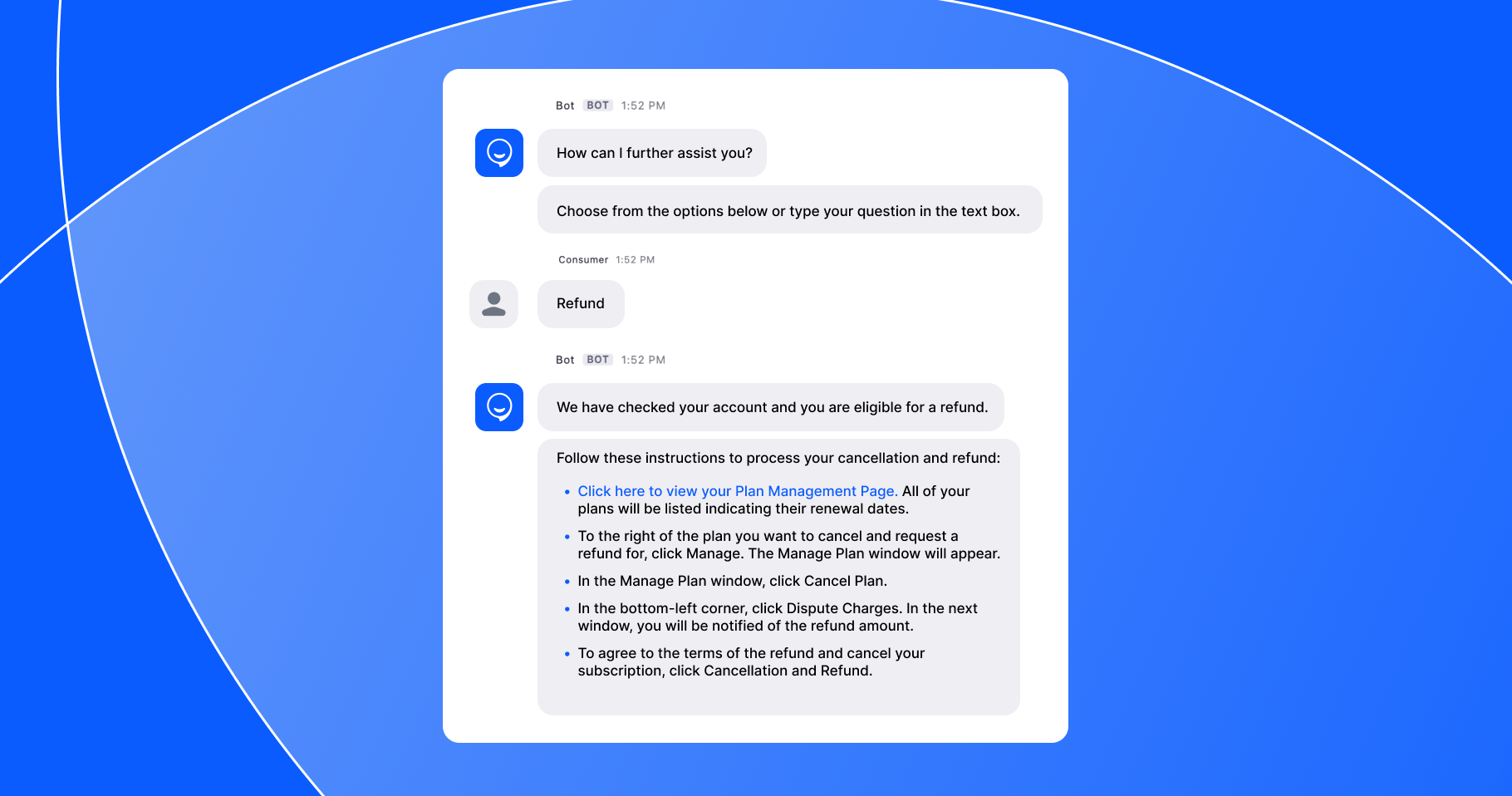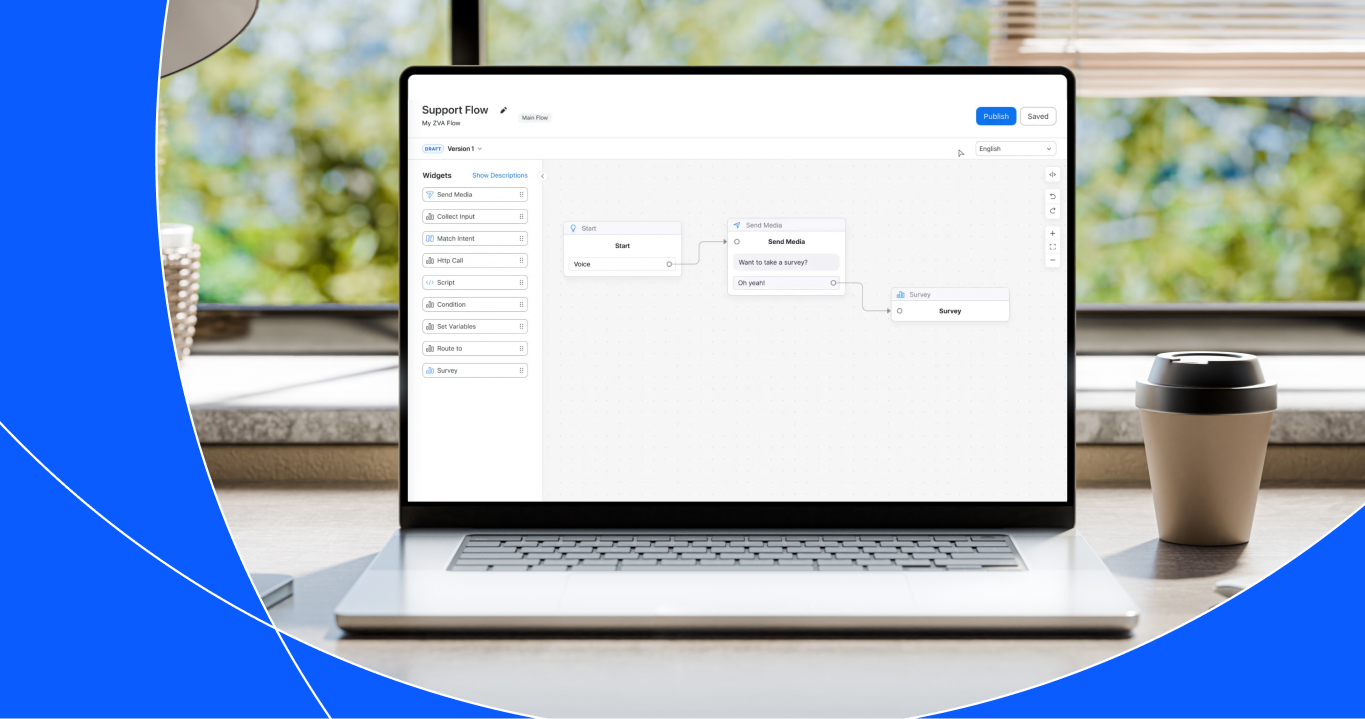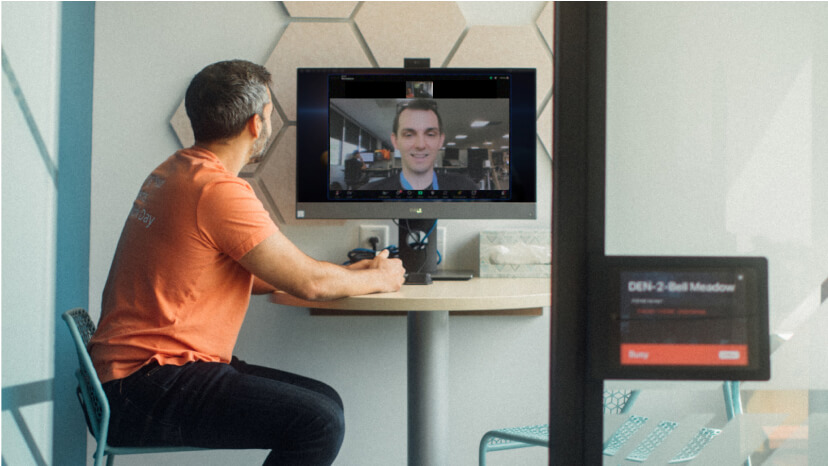containment rate with Zoom Virtual Agent for Voice
Zoom on Zoom: Setting the standard for AI self-service with a 25-point lift in CSAT to 80%
We’ve experienced a significant boost in customer satisfaction using our own AI chatbot, Zoom Virtual Agent. Here’s how.
Updated on December 31, 2025
Published on February 03, 2025

- 01 Zoom Virtual Agent: Friendly, fast, and powered by AI - Jumplink to Zoom Virtual Agent: Friendly, fast, and powered by AI
- 02 Knowledge is power: How an in-depth knowledge base is a game-changer - Jumplink to Knowledge is power: How an in-depth knowledge base is a game-changer
- 03 Better metrics + new insights = improved customer experience - Jumplink to Better metrics + new insights = improved customer experience
- 04 Artificial intelligence and machine learning enhance self-service - Jumplink to Artificial intelligence and machine learning enhance self-service
- 05 Experience Zoom Virtual Agent for yourself - Jumplink to Experience Zoom Virtual Agent for yourself

increase in CSAT from 55% to 80% overall
agent hours saved per month on billing issues alone with Zoom Virtual Agent for Voice
As AI continues to reshape the contact center industry, it’s easy to see why the customer experience needs to evolve. To remain brand loyal, today’s consumers expect instant, accurate resolutions, self-service chatbots, personalized interactions, and channel choice. But as 60% of consumers say they’ll leave a brand after just one or two negative experiences, it’s more important than ever to reevaluate your CX initiatives to ensure customer satisfaction.
As CX analysts predict, the average virtual agent is becoming more integrated within customer engagement platforms, paving the way for responsive, autonomous AI agents that provide a more personalized experience. With that transition, businesses need to focus on bolstering their CX capabilities by leveling up their AI agents to handle repetitive interactions on their own. This frees up human agents to focus on the more complex tasks.
At Zoom, we’ve seen this transformation firsthand with our AI-first self-service solution, Zoom Virtual Agent for Chat and Voice, built and deployed by Zoomies. Part of the broader Zoom CX suite of products, Zoom Virtual Agent enables customers to get the support they need, whenever they need it. Whether searching for help with common issues like “Join a Meeting” or “Upgrade my Account,” our customers can quickly and accurately get answers to their questions. And if a customer does need to speak to a live agent, the interaction can be quickly passed on with context, reducing friction and repetition.
Since offering Zoom Virtual Agent to customers through our website, we’ve achieved a 98% containment rate—that’s 98 out of 100 intelligent virtual agent conversations successfully resolved without the involvement of a live agent. Not a small feat!
But what further enhanced our service is the addition of our new Zoom Virtual Agent for Voice. In just a few months, we’ve experienced a 76% containment rate and reduced our abandonment rate from 23% to a mere 1%.
The success we’ve seen with Zoom Virtual Agent has had a positive impact on the service we deliver to our customers as a whole. Our CSAT score has increased by 25%, from 55 to a notable 80%, and there’s been an overall 16% reduction in the number of tickets raised.
And just as impactful is the improvement we’ve seen in query understanding. Our no-match rate has dropped from 35% to 0%, meaning that virtually all customer requests can be accurately interpreted by Zoom Virtual Agent. Instead of asking users to “rephrase your query,” the system now understands intent on the first try. This level of semantic accuracy is only possible with agentic AI, and it’s dramatically improving both customer experience and operational efficiency.
If we take a closer look at ‘Billing’, one of our most common use cases, the results we’re seeing are striking. Deflection rates have increased from 0% to 30% in just three months, saving the team over 1,000 agent hours per month on billing issues alone.
With the new agentic Zoom Virtual Agent experience, we can rely on a single source of truth through our knowledge base, enabling us to answer hundreds of questions without building complex, time-consuming intents that risk putting users into circular flows.
Yuliya Pierce, CX solutions leader, Zoom
But we didn’t start out this way.
Like many companies with rapid growth, Zoom’s landscape and technical requirements evolved, and we quickly outgrew the capabilities of our previous chatbot. We needed a scalable solution that would allow us to maintain the high level of customer satisfaction we wanted to uphold. With millions of customer requests and chatbot sessions each month, it was time for a change.
Today’s consumers crave personalized experiences, and as many as 85% expect agents to be friendly, and 82% expect them to be knowledgeable. Following the launch of Zoom Contact Center in 2022, we acquired the conversational AI platform, Solvvy, and began developing Zoom Virtual Agent (ZVA).
As part of Zoom Virtual Agent’s workflow development, we’ve uncovered new insights into the customer journey that were missing from our previous chatbot. Thanks to advanced metrics and robust analytics, our team could identify where and how customers find help and redesign our workflows to facilitate quicker resolution.
And when it comes to building and refining workflows, the process is now simpler than ever. With the no-code setup in Zoom AI Studio, getting started is straightforward. We simply define the agent’s mission in natural language, connect the knowledge and data sources it needs, and activate the skills that allow it to take real action. Checking orders, updating accounts, managing returns, and so much more can all be taken care of by Zoom Virtual Agent. Before going live, we can even run live simulations to see how the agent performs across realistic scenarios.
It’s changes like these, which can be quickly tested and adjusted, that are adding significant value. Yuliya shares the impact the team, and our customers, have been experiencing:
“The conversational capabilities now let AI follow the flow of the conversation, even when customers switch topics. It stays empathetic, pulls the right info from the knowledge base, and builds a guided workflow on the fly so customers can resolve all their issues in one seamless experience.”

Who hasn’t been in a situation as a consumer where you’ve hit a wall with a chatbot? You can’t get any further, yet you can’t get through to a human. With Zoom Virtual Agent, when a conversation needs to be transferred to a live agent, AI Expert Assist carries over the full context, allowing for a seamless handover without requiring the customer to repeat themselves.
Zoom Virtual Agent goes beyond simple question-and-answer interactions by using agentic AI with conversational memory and reasoning. This means that Zoom Virtual Agent can understand context across multiple steps, adapt as the conversation changes, and take action on its own when needed, rather than forcing customers through rigid decision paths.
Through a deep integration with ServiceNow, one of the many third party apps supported, Zoom Virtual Agent can pull in the right context, access nearly 4,000 knowledge base articles, and take action during self-service conversations. Adding this many articles to our knowledge base enables us to train Zoom Virtual Agent on various topics without needing to spend time building limited workflows based on intent. The result is faster resolutions, more accurate answers, and a much smoother experience for our customers.
By integrating with back-end systems and using automation, Zoom Virtual Agent can resolve even very specific customer issues more effectively. For example, at Zoom we first use APIs to access customer account details. We then implement AI to determine workflows by troubleshooting the customer’s situation and outlining which steps to take. This makes it possible to personalize many use cases without requiring the development of separate workflows for each scenario.
For the more complex issues, we’re leveraging advanced retrieval augmented generation (RAG) technology. By feeding RAG a library of comprehensive articles, Zoom Virtual Agent can reference multiple knowledge base sources to create comprehensive, precise, and personalized answers for customers. This means that self-service can solve most queries, speed up resolutions, and reduce handling times. Jeff Harling, head of digital customer experiences, is excited about the results:
“The integration of RAG is a huge win for us. It’s leveraging AI to improve the ability for Zoom Virtual Agent to respond to customers’ more abstract questions.”
Understanding the customer journey means studying how and where our users find the support they need. This requires pulling data from a deeper level. Historically, agent assist tools tend to only pull articles from the first query, which is often a greeting. This doesn’t provide much insight into the customer issue. Our customer support team and our customers can arm themselves with the information they need to adjust flows to match intents.
“Agentic AI helps save us so much time by quickly identifying trends and patterns,” shares Yuliya, “The analytics within Zoom Virtual Agent can provide the top reasons customers contact us. We can then filter by skill or tool used to quickly analyze large amounts of data and get better insight into customer engagements.”

Not only can we help our customers resolve their issues more quickly, but our current AI chatbot also reduces the burden on our support agents by handling the millions of self-service interactions we receive each month.
It has been reported that 93% of customers are likely to make repeat purchases with companies that offer excellent customer service. Zoom Virtual Agent’s intelligent routing capabilities enable our customers to escalate a conversation to a live agent and transfer the chat history seamlessly, eliminating the need for customers to repeat themselves. This not only streamlines the engagement between the customer and agent but also empowers our customer support agents to resolve issues with a better understanding of each customer’s needs. With our CSAT scores on the rise and feedback like “The response was exactly what I was looking for. Impressive considering it was somewhat specific. Thank you!”, Zoom Virtual Agent is helping us deliver the excellence our customers expect.
Today, our customers can self-serve with more convenience than they’ve ever had. Unlike many chatbots on the market that require extensive coding of keyword variations, our proprietary agentic AI capabilities can accurately interpret what customers are asking using their natural language. Our next-generation Zoom Virtual Agent can handle even complex queries. It remembers details from previous chats and asks follow-up questions, just as an agent would. And because Zoom Virtual Agent has Natural Language Understanding (NLU) built in, it can handle curveballs, accent variations, and mispronunciations with ease, resolving even tricky issues in full, without the need for escalation. This extra level of intelligence requires less maintenance and has a lower total cost of ownership (TCO) than traditional “rule-based” chatbots, and it delivers a better customer experience.
Elevating AI Quality with Zoom Virtual Agent
In a time where we’re all expected to do more with less, it’s not always feasible to hire more agents or outsource work. Not to mention, onboarding can be time-consuming, expensive, and even risky. With Gartner predicting that chatbots will become a primary customer service channel within the next few years, more and more businesses are finding ways to integrate AI into their customer experiences to maintain a competitive advantage.
Zoom Contact Center and Zoom Virtual Agent can help you leverage AI and machine learning within your own business to drive a more substantial ROI. Built on the Zoom platform, our customer experience solutions integrate with leading CRMs and help desk software so you can grow and scale your customer service initiatives. And with the help of AI to power our platform, we’re enabling teams to work smarter together to meet growing consumer expectations.
Find out how we can help you:
- Quickly, accurately resolve issues 24/7
- Reduce handle times and call queues
- Increase your CSAT with intelligent hand-offs
- Access actionable insights
- Gain deeper insights that help you continuously improve your CX
- Seamlessly integrate with your existing tech stack
Contact us today to learn more about Zoom Virtual Agent and Zoom Contact Center.












